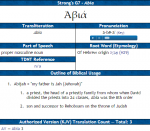Valiant the first part of your reponse caused me to remember another question of mine, and Im shooting it in your direction because of how you worded "prince of the house of David"
Its this part here (the way it is worded...
Mat 2:6 And thou Bethlehem,in the land of Juda,
art not the least among the princes of Juda:
for out of thee shall come a Governor,
that shall rule my people Israel.
Like, why is it written that way?
Because there (as I keep on rolling it around, seems to be calling THOU (Bethlehem) OF the land of Juda A PRINCE (of among other princes)
(although, not him in particular there) but rather Bethlehem itself (a prince)
For out of thee (Bethlehem of Juda) shall come (the him) a Governor.
Its stuff like that I will mind that can drive me bonkers
But that adoptive thing you pointed out, thats how I was wondering about it in respects to the seed (even that promised to David) and the raising of this seed (even the word of promise) up for another is also shown in what was practiced among themselves.
Like, one might be of the son by nature of one father (according to the flesh) as he was likewise made of the seed of David according to the flesh (he being made in the likeness of sinful flesh) but on the otherhand conceived by a different Father (even by the Holy Ghost) according to the promise (which is likewise according to the law).
So using those things practiced among themselves to consider the two natures (according to the promise) one after the flesh in one sense of it and the other according to the Spirit in another, Son of man, Son of God, but being the seed of the woman (wife espoused to a Son of David, Joseph of house and lineage of the same) where these two (even before coming together are considered one flesh in this thing.
Okay, I am rambling and shouldnt thnk aloud but I liked your post and your got my wheels spinning, so thanks

